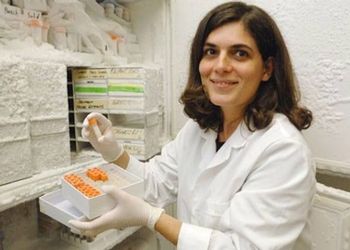MSU tests Detroit-area wastewater for early COVID-19 detection
Associate Professor Irene Xagoraraki will expand her ongoing COVID-19 detection program in the Detroit area with an $800,000 grant.
January 12, 2021
Michigan State University researchers have received $2.1 million in grant funding to test for the novel coronavirus in wastewater, including from the Detroit area, which has the potential to be an early warning system for the presence of COVID-19.
The funding was provided by the Michigan Department of Environment, Great Lakes and Energy, and the Michigan Department of Health and Human Services from Michigan’s allocation of federal money under the Coronavirus Aid, Relief, and Economic Security Act, or CARES. Existing COVID-19 wastewater surveillance programs were funded to quickly establish a standardized and coordinated network of monitoring systems across the state.
Joan Rose, Homer Nowlin Chair in Water Research at MSU, was awarded $1.3 million of the total funding to train and assist labs with analytical methods.
Irene Xagoraraki, associate professor of civil and environmental engineering at MSU, was awarded $800,000 to expand an ongoing COVID-19 detection program to test untreated sewage in the Detroit area. In 2017, she received funding from the National Science Foundation to begin a wastewater-based epidemiology project in collaboration with the Great Lakes Water Authority and the Detroit Water and Sewerage Department. In April 2020, Xagoraraki received additional funding to focus on COVID-19 and develop an early warning system for the metro Detroit area.
“Our early work confirmed the validity of the method to provide early warning of multiple viral diseases, including COVID-19,” Xagoraraki said. “The Detroit project goes above and beyond simple testing of wastewater. We include multiple other data, measurements and processes to provide a tool that can be used by public health officials.”
DWSD, GLWA, and MSU have been at the forefront of U.S. wastewater utilities using the sewer system to help identify virus outbreaks.
“The expansion of the partnership gives us targeted information that is critical in our battle against COVID-19,” said Denise Fair, City of Detroit Chief Public Health Officer. “The expanded reach of this study allows us to pinpoint neighborhoods and zip codes where COVID-19 is trending upward, and we can use this information to reach out to residents and businesses in those areas to reinforce our messaging with regard to testing, quarantine protocols, contact tracing and even assistance for businesses who need help in developing a plan to operate while keeping their employees safe during this pandemic.”
The approach that Xagoraraki and the team are using is focused on community composite sampling and analysis. It is a wastewater-based-epidemiology method directly applicable to urban metropolitan areas with centralized wastewater collection.
“Our approach has the potential to provide warnings earlier than traditional systems focused on clinical diagnostics – rapid or not – which are inherently limited to an after analysis of an outbreak,” said Xagoraraki.
LEARN MORE about making a gift to the College of Engineering by contacting Senior Director of Development Stephen Bates at batesst@msu.edu or by calling (517) 355-8339.




